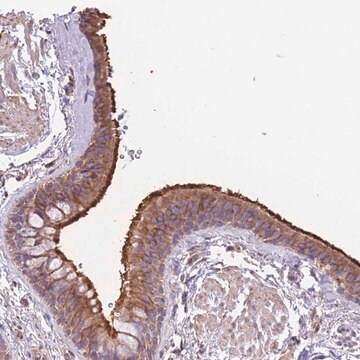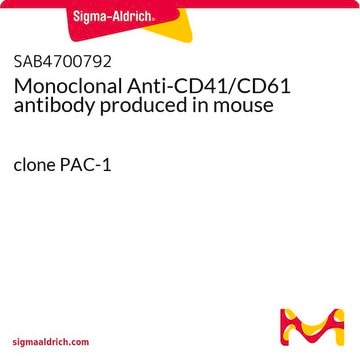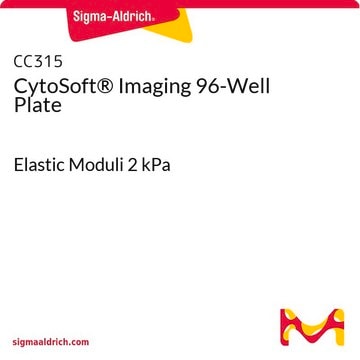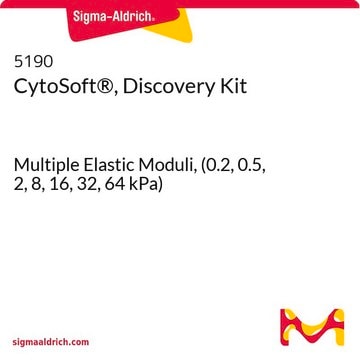CC319
Plaque à 96 puits CytoSoft® pour l'imagerie
Elastic Moduli 64 kPa
Se connecterpour consulter vos tarifs contractuels et ceux de votre entreprise/organisme
About This Item
Code UNSPSC :
12352207
Nomenclature NACRES :
NB.15
Produits recommandés
Description générale
The rigidity of the cell′s substrate (such as the extracellular matrix) can have a profound effect on cell function including morphology, differentiation and gene expression. Young′s elastic modulus is a mechanical property that measures the stiffness of a solid material. It defines the relationship between stress and strain in a material and is measured in kPa.
CytoSoft® plates provide a tool to culture cells on substrates with defined rigidities covering a broad physiological range (0.2 kPa- 64 kPa). On the bottom of each well, there is a thin layer of specially formulated biocompatible silicone, whose elastic modulus (rigidity) is carefully measured and certified. The surfaces of the gels are functionalized to form covalent bonds with amines on proteins. The gel readily binds to purified ECM proteins, such as PureCol type I collagen (5006), prior to cell addition.
CytoSoft® Imaging plates are designed for high-resolution imaging where low autofluorescence and exceptional optical clarity are required. These plates accommodate both live cell imaging and common fixation techniques such as immunostaining. Plate consists of a 175 μm thin polycarbonate film-bottom plate bonded with a black polystyrene frame and includes a lid. The plates are sterilized using ozone and provided with 1 plate per package.
Note: Use these recommendations as guidelines to determine the optimal coating conditions for your culture system. The bottom of the plate can be detached by excessive mechanical force such as centrifugation or direct contact with liquid handling tools (tips, pipettes, etc.).
1. Remove the CytoSoft® product from the protective sleeve in a sterile hood.
2. Prepare extracellular matrix material by neutralizing in amine-free buffer pH 7.4 to 7.9 (such as 1X DPBS). We do not recommend using gelatin as your ECM protein. Note: Pre-warm the coating solution to approximately room temperature before use.
3. Dilute as needed, and dispense 1 mL of solution into each well to coat the surface. Note: Recommended dilution for PureCol Type I collagen is 1:30 (~100 μg/ml). Note: The hydrophobic surface requires larger volumes to cover the surface than do conventional plastic dishes
4. Incubate ECM coated CytoSoft® at room temperature, covered for 1 hour.
5. After incubation, aspirate any remaining material and rinse coated surfaces immediately two times with culture medium or PBS. Leave about 2.5 mL of medium per well to keep surface covered.Note: Do not allow the CytoSoft® surface to become dry once the surface has been wetted.
6. Coated surfaces are ready for use. Standard harvesting procedures used for removing cells from cultureware can be employed for harvesting cells from the CytoSoft® product including use of trypsin, Accutase and non-enzymatic cell detachment solutions.
CytoSoft® is a registered trademark of Advanced BioMatrix, Inc.
CytoSoft® plates provide a tool to culture cells on substrates with defined rigidities covering a broad physiological range (0.2 kPa- 64 kPa). On the bottom of each well, there is a thin layer of specially formulated biocompatible silicone, whose elastic modulus (rigidity) is carefully measured and certified. The surfaces of the gels are functionalized to form covalent bonds with amines on proteins. The gel readily binds to purified ECM proteins, such as PureCol type I collagen (5006), prior to cell addition.
CytoSoft® Imaging plates are designed for high-resolution imaging where low autofluorescence and exceptional optical clarity are required. These plates accommodate both live cell imaging and common fixation techniques such as immunostaining. Plate consists of a 175 μm thin polycarbonate film-bottom plate bonded with a black polystyrene frame and includes a lid. The plates are sterilized using ozone and provided with 1 plate per package.
Note: Use these recommendations as guidelines to determine the optimal coating conditions for your culture system. The bottom of the plate can be detached by excessive mechanical force such as centrifugation or direct contact with liquid handling tools (tips, pipettes, etc.).
1. Remove the CytoSoft® product from the protective sleeve in a sterile hood.
2. Prepare extracellular matrix material by neutralizing in amine-free buffer pH 7.4 to 7.9 (such as 1X DPBS). We do not recommend using gelatin as your ECM protein. Note: Pre-warm the coating solution to approximately room temperature before use.
3. Dilute as needed, and dispense 1 mL of solution into each well to coat the surface. Note: Recommended dilution for PureCol Type I collagen is 1:30 (~100 μg/ml). Note: The hydrophobic surface requires larger volumes to cover the surface than do conventional plastic dishes
4. Incubate ECM coated CytoSoft® at room temperature, covered for 1 hour.
5. After incubation, aspirate any remaining material and rinse coated surfaces immediately two times with culture medium or PBS. Leave about 2.5 mL of medium per well to keep surface covered.Note: Do not allow the CytoSoft® surface to become dry once the surface has been wetted.
6. Coated surfaces are ready for use. Standard harvesting procedures used for removing cells from cultureware can be employed for harvesting cells from the CytoSoft® product including use of trypsin, Accutase and non-enzymatic cell detachment solutions.
CytoSoft® is a registered trademark of Advanced BioMatrix, Inc.
Stockage et stabilité
Conserver les plaques d'imagerie CytoSoft à température ambiante.
Informations légales
CytoSoft is a registered trademark of Advanced BioMatrix, Inc.
Clause de non-responsabilité
Sauf indication contraire dans notre catalogue ou toute autre documentation associée au(x) produit(s), nos produits sont uniquement destinés à la recherche et ne sauraient être utilisés à d'autres fins, ce qui inclut, sans s'y limiter, les utilisations commerciales non autorisées, les utilisations diagnostiques in vitro, les utilisations thérapeutiques ex vivo ou in vivo, ou tout type de consommation ou d'application chez l'être humain ou chez l'animal.
Code de la classe de stockage
11 - Combustible Solids
Classe de danger pour l'eau (WGK)
WGK 3
Point d'éclair (°F)
Not applicable
Point d'éclair (°C)
Not applicable
Certificats d'analyse (COA)
Recherchez un Certificats d'analyse (COA) en saisissant le numéro de lot du produit. Les numéros de lot figurent sur l'étiquette du produit après les mots "Lot" ou "Batch".
Déjà en possession de ce produit ?
Retrouvez la documentation relative aux produits que vous avez récemment achetés dans la Bibliothèque de documents.
Notre équipe de scientifiques dispose d'une expérience dans tous les secteurs de la recherche, notamment en sciences de la vie, science des matériaux, synthèse chimique, chromatographie, analyse et dans de nombreux autres domaines..
Contacter notre Service technique




